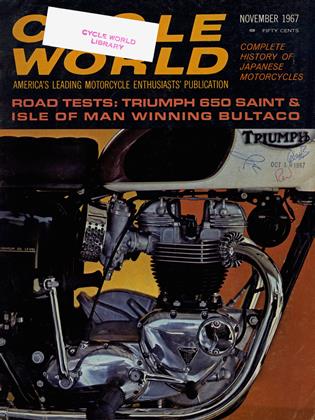EUROPEAN ENOORO CHAMPIONSHIP
HEINZ J. SCHNEIDER
MOTORCYCLISTS' CHANCES of holding one or another international title this summer have been increased by eight. For the first time in nearly 60 years of competition, enduro-type trials riders got their European championship — this year's test series is called Europa-Cup. The Federation Internationale Motorcycliste, the governing body of the sport, had worked out regulations for the 50, 75, 100, 125, 175, 250, 350 and over 350cc classes. Three well established international events were used as title matches: the Austrian Alpentrial, the Czechoslovakian two-day trial at Straconice — where the CZ bikes are made — and the West-German three-day trial at Garmisch-Partenkirchen on traditional International Six Days Trial terrain.
Finished in the middle of June at Garmisch, the Cup-competition saw WestGerman Ziindapp riders Lenz Müller and Dieter Kramer win the 100 and 125cc classes, with the smaller class netting a sweep for the Munich factory team. In the 125s, Maico-mounted Heino Buse finished second ahead of Austrian Werner Wabnig on a new Puch.
West-German Herbert Scheck was successful on his 360cc Maico. Czechoslovakian Jawa-CZ rider Briza was a forceful competitor in the big bores, winning his home round and the meeting at Gartnisch, where Scheck was lucky to finish, having bent his bike in a crash. But having not been to Austria, Briza and his teammate Miarka had no chance to finish better than second and third overall.
The 50cc round was won by Austrian Heribert Dietrich on a Puch, who beat East German Ewald Schneidewind on a
Simson and West German Andreas Brandl on a Ziindapp, who was thrown back by lost minutes in the Straconice event.
The East Germans walked off with half the trophies offered. Lother Schünemann got the 75cc cup on a Simson, narrowly beating teammate Roland Stubenrauch and the Ziindapp team of Günter Lüken and Richard Hessler.
ISDT-winning MZ riders — still on the piston-port models — succeeded in the 175, 250 and 350cc classes. Horst Erdmann and Klaus Halser made it a double in the 175s, with Lorenz Specht on a Zündapp third, Bernd Uhlman and Bernd Seyfert again scored a double on the 250, with Czechoslovakian Zdenik Cespiva third on a Jawa. Karlheinz Wagner held off Jawa riders Kvetoslav Mausita and Josef Fojtik with the 350cc bike.
As far as testing the idea of a European rough rider's championship, this year's series could be regarded as a success. The idea was to put some spice into international time-trial competition, but the famous International Six Days Trial is still regarded as the event to win in this business. Its public appeal, however, seems to go down with the years. So a championship, held in a sequence of meetings, might draw more attention of riders, industry, public and advertising.
As far as using it as a pattern of coming championship«, the series holds snags enough to make FIM officials grow grey hair over the winter.
The three meetings were not fully integrated into the Cup-series. In fact, riders competed in two different events each time. In this type of trial, riders have to
cover a given distance in a given time. Every additional minute needed in a section costs a rider one bad mark. To separate the good guys who do not lose marks, special tests were introduced, where sheer speed counts. That is the old way enduro events were held. Those who wanted to compete in the Cup-game this year were noted in a second file. They received one bad mark for every second they needed in a special test, all added up during the series. For every minute behind schedule at the check-points, 60 bad marks were added to the score. The man with the smallest bag at the end of the series was champion. So, if a rider had lost a minute on the distance, say by mending a puncture or looking for his chain in a stream, he was given the theoretical chance of winning these 60 marks back by beating his rivals in the tests. This, however, does not conform with the original idea of a long distance enduro, which also is a trial of reliability. So, if your bike has to stop out on the circuit, you have to be punished accordingly.
On the other hand, not all special tests counted toward the Cup. Riders had to ride more of them to win the event than they had to ride for the title. That, for example, let Volker Kramer on his 50cc Zündapp win the Alpen-trial with best overall times in seven tests, but in those four which counted for the cup, his teammate Andreas Brandl had the better end, thus leading the Cup-scoring. So, if an event counts toward the title, the genuine placing in this very meeting should be considered for the scoreboard.
Also, there has been a complaint that three meetings are not enough for a clear decision. Right! Italian Valli Bergamasche, the four day event of East Germany, perhaps the Welsh Three Day Trial and perhaps one of the tough Scandinavian meetings should be added. But it is wrong to aim for a scrambles and road racing type of scoring, where not all meetings count
but a limited number of best results, giving a man a chance who had had to retire on one or two heats. As it is impossible for a private entrant to win the title anyway, the argument that the cost of traveling prohibits competition all over Europe during the summer, in addition to national events, does not bear sufficiently. And, as
I have said, enduro riding iá»a competition of reliability, and a bike that dropped out simply is not as reliable as these which did not, so all meetings held should count.
As long as the not-to-be-disturbed Californians on their Triumphs, or other Americans do not compete in the championship, results may not be interesting. ■












